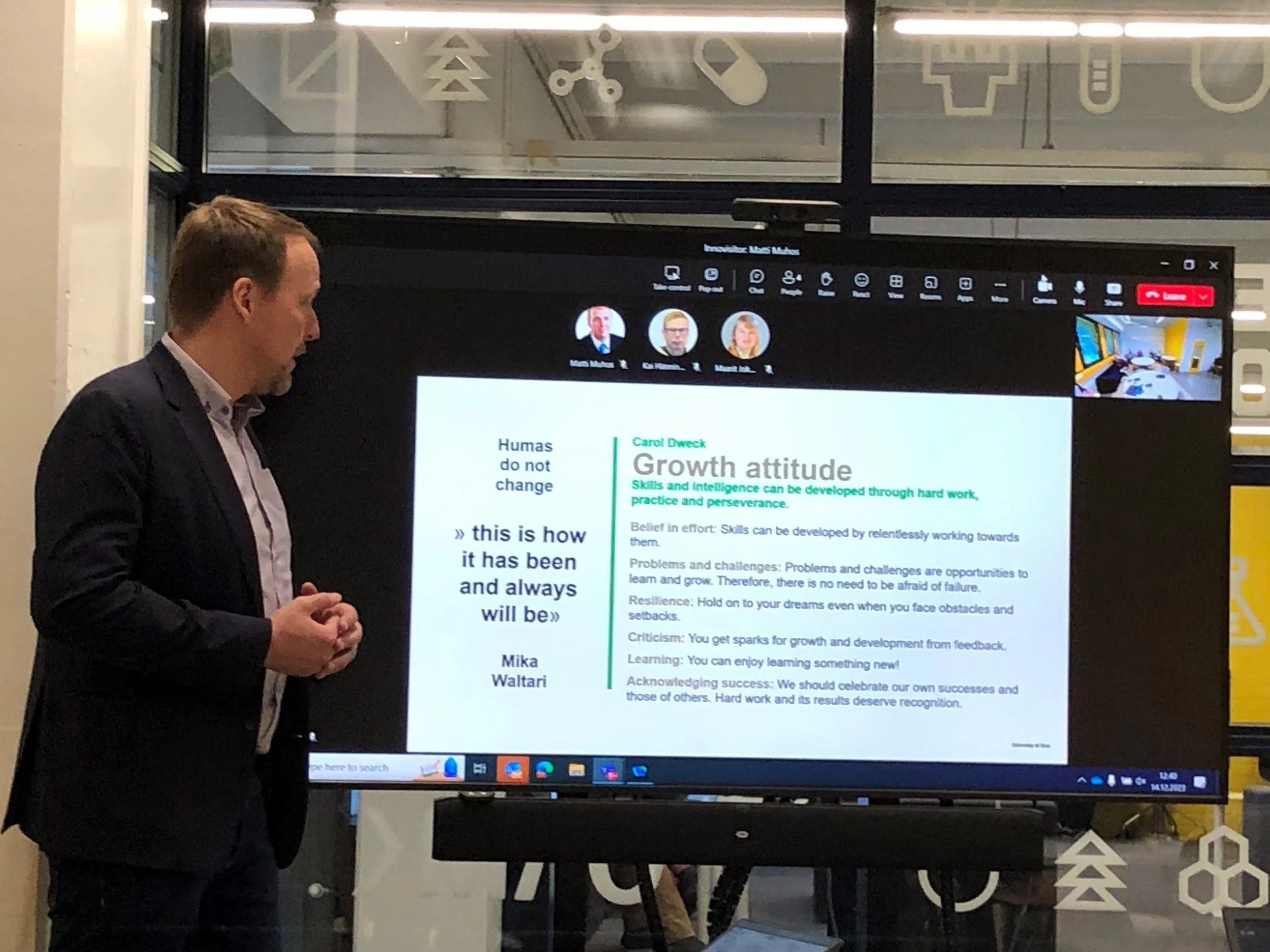In Finland, the fear of failure prevents from becoming an entrepreneur – Matti Muhos is doing research on why the situation is the opposite in other Nordic countries
Written by Vilma Lehto
At the InnoVisitor event organized by the Innovation Centre, Matti Muhos discusses how entrepreneurship is perceived in different Nordic countries. Photo: Kaisa Still
Finns are afraid of failure. This is evident at least in the fact that we dare not become entrepreneurs. Where does this fear come from? In other Nordic countries, people become entrepreneurs more boldly, so why does the situation change when we are inside the borders of Finland?
In Finland, there is a proven lower rate of business establishment than in Sweden and Norway, for example. The topic has been studied by Matti Muhos, who works at the University of Oulu as a professor of growth management, renewing business and digitization, and as the director of the Kerttu Saalasti Institute.
“In comparison, according to the World Bank, the rate of establishing new businesses in Finland is relatively low. Based on this, we were particularly interested in the Nordic comparison", Muhos explains.
The amount of fear increases
Muhos was involved in implementing the Global Entrepreneurship Monitor study last year. According to him, what was interesting in the research results was how the fear of failure has grown in Finland. In 2015, 40 percent of Finns saw the fear of failure as a barrier to starting a business, while in 2021 the same figure was already 50 percent.
“In addition, in Finland there is a noticeable gender gap, i.e., 60 percent of women see the fear of failure as a barrier to starting a business. For men, the corresponding figure is 40 percent. There was no similar gender gap in the selected comparison targets of Sweden, Norway, and the Netherlands. We became interested in understanding the reasons behind the gender gap.”
Text continues after the photo.
The fear of entrepreneurship is particularly high among Finnish women. Reference: https://www.gemconsortium.org/report/global-entrepreneurship-monitor-20212022-finnish-report
Muhos has previously studied country-specific differences in entrepreneurship, comparing the situation in Finland, for example, to Asia, Brazil, and California.
“I have always thought of the Nordic countries as obvious and too similar to Finland, but now I wanted to take the bull by the horns and find out what happens when you start researching the topic. I have long dreamed of doing growth management research in the Nordic countries.”
Research on the Nordic countries and Gen Z
Now the focus is on the Nordic countries and the Gen Z generation, i.e., entrepreneurs born between 1997 and 2012.
“This generation was selected as the subject of the study because it is currently the fastest growing generation in the workforce. I’m interested in knowing what kind of future young entrepreneurs are building for us and what things are important to them in entrepreneurship and business management.”
Muhos first headed to Iceland on his journey, then to Denmark, and from there to Norway and Sweden. At the destinations, he was able to discuss with local entrepreneurs, and interviewees were found through both partner universities and by chance.
“In Denmark, I stayed at a Bed and Breakfast, and found interviewees for my research through the networks of the accommodation owner”, Muhos recalls.
At the moment, the research data has been collected, and only in Finland the interviews are still ongoing. The actual publication of articles will begin next year.
Muhos emphasizes that the information highlighted in his presentation constitutes the researcher's initial observations, not yet formal research results, even though they are based on interviews.
Boldly towards entrepreneurship
From the observations collected in Iceland, Muhos highlights how the harsh Icelandic nature itself encourages seizing opportunities when they are still possible. It seems that the mentality towards entrepreneurship in the country is courageous.
“Based on the interviews, there are Icelandic entrepreneurs that have experienced major failures, but for them reputation is more durable than money. A good reputation thus withstands occasional financial losses and positive risk-taking specifically enhances reputation. So, Icelanders do not have the ‘safe bet’ thinking that is familiar to Finns.”
In Iceland, people grow into the world of entrepreneurship. Work and entrepreneurship are combined from childhood, and education is not seen as binding as it is here in Finland.
“If someone works, for example, as a teacher, they might drive a snow blower in the evenings.”
Also, belief in one’s own doing is in a class of its own. Investments are made from one’s own wallet if financing is not obtained. In addition, Icelanders support each other and are ready to share their own networks for the use of a new entrepreneur.
Learning from other Nordic countries
In Denmark, entrepreneurship is encouraged in a completely different way than in Finland. For example, students are encouraged to become entrepreneurs in many different ways. You can do university internships in your own startup, and some universities even offer full-service startup communities to help and advise students.
“In Finland, becoming an employee is the norm supported by structures. Entrepreneurship is seen as an exception. In Finnish higher education institutions, we could invest more in promoting entrepreneurial skills and engaging in concrete business experiments during the student years”, Muhos says.
“In addition, we could provide opportunities to gain experience so that young people would have the skills and courage to seize their own dreams. The way we raise young people affects why they are not driven into the world of entrepreneurship or why gaps appear between genders. For example, in Iceland, there are active gender equality-promoting women’s entrepreneur networks that we could take as a model.”
Matti Muhos visited the Innovation Centre as an InnoVisitor in December. The next InnoVisitor will be held on January 25, when the visitor will be Niina Karvinen. The topic will be social innovations.
Vilma Lehto
Viestinnän harjoittelija / Communications Intern
+358 50 305 5761
vilma.lehto@oulu.fi
Blogitekstit, uutiset, sosiaalinen media, tapahtumaviestintä.
Blog posts, news, social media, events communication.




